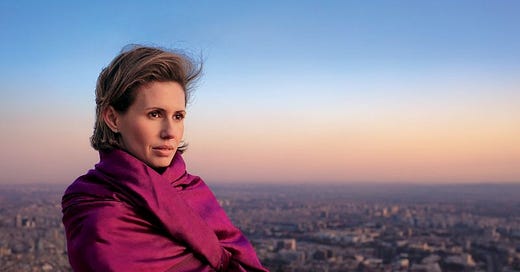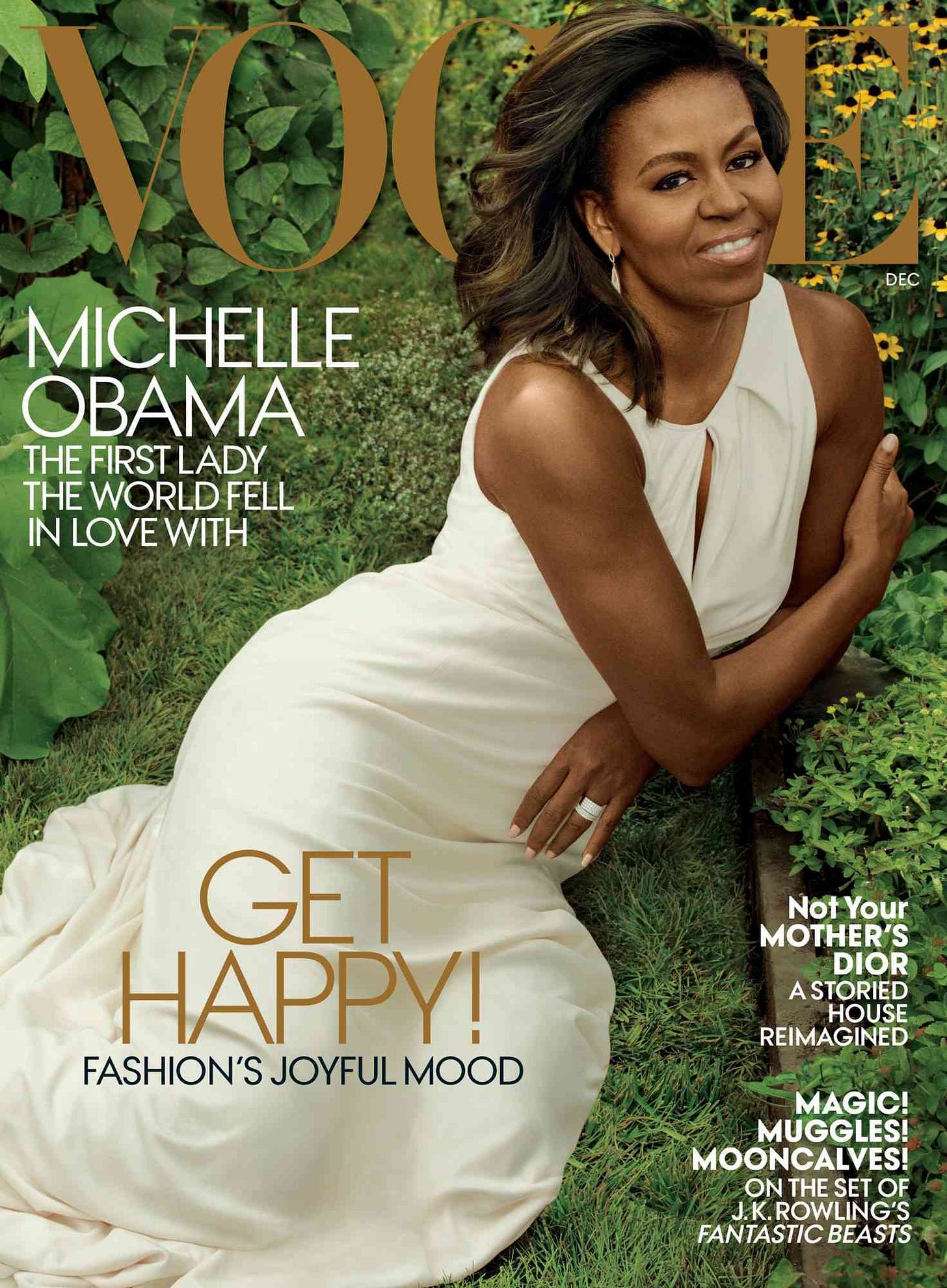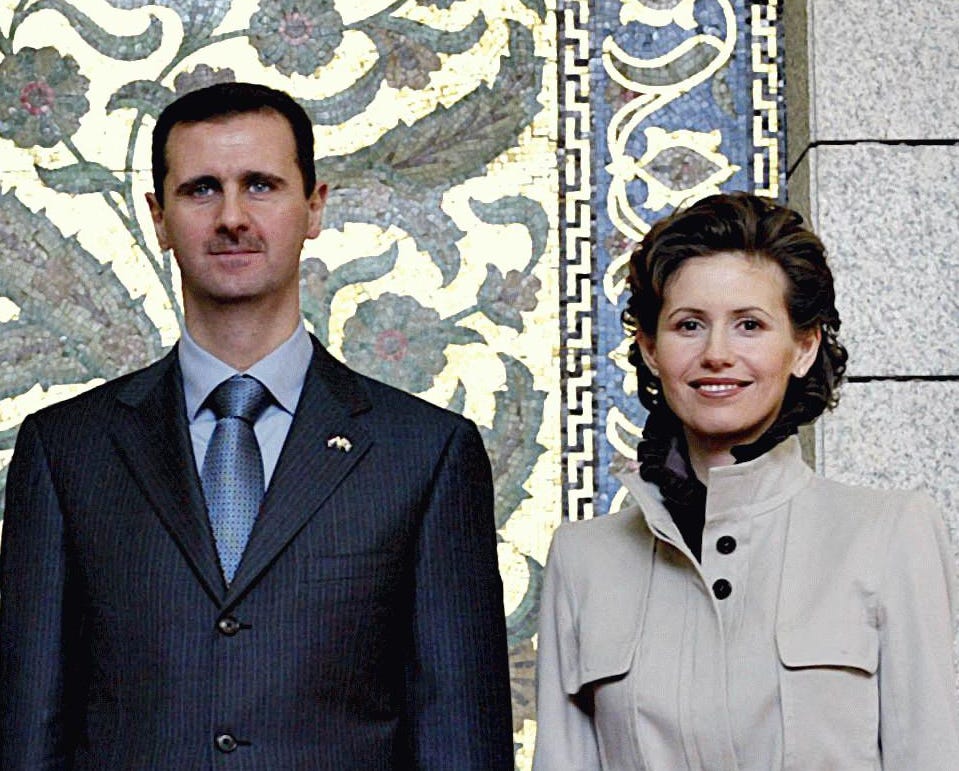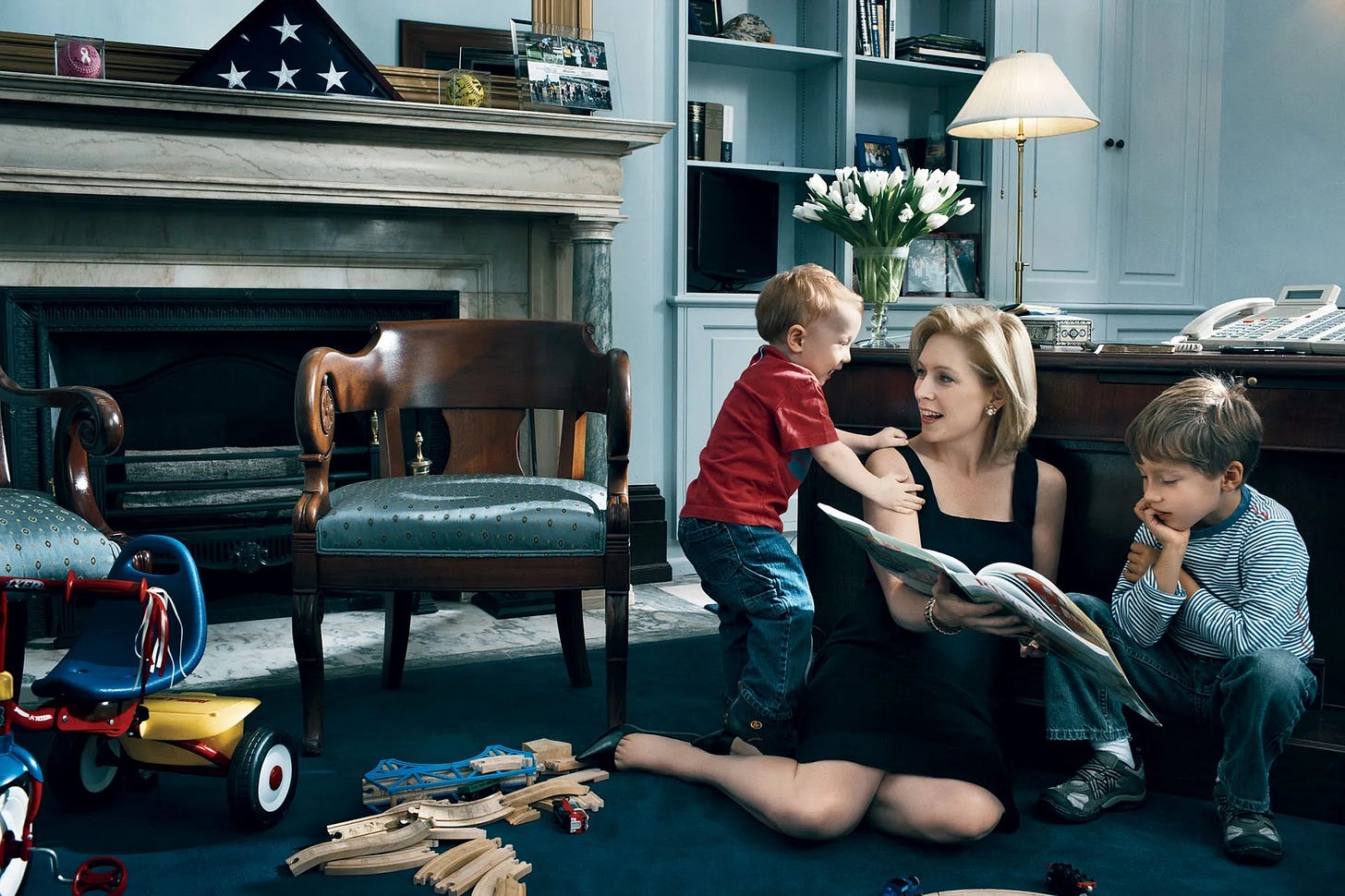Issue 17: The Dictator’s Wife
That time Vogue wrote a glowing profile of the despotic Syrian President’s wife.
It’s early 2011. Protests have begun in Syria following the Arab Spring uprising in Tunisia that led to nationwide pushback against state corruption. Thousands of people take to the streets to protest Bashar al-Assad, the country's President. He had been approved for another seven-year term in power in 2007 with a 97.6% share of the votes in an election where opposition parties were banned and he was the only candidate. Anti-Assad protests are met with state-sanctioned violence. Various countries, including the United States, begin implementing sanctions against the Assad government. Units of the Syrian Army, led by Assad's brother, stormed a gathering in a Sunni mosque in Daraa, killing five civilians. The crackdown on protests results in deaths and injuries. The following year, Human Rights Watch will reveal that at least 27 torture centres run by Syrian intelligence agencies, where prisoners are beaten and electrocuted, are in operation during this time.
And in the midst of this, Vogue releases a profile of Asma al-Assad, the first lady of Syria. She is heralded as a great beauty and guiding force in making Syria a bastion of democracy in the Middle East. People die and a dictator’s wife gets to model for the masses. In the long and storied history of Vogue, this is one of their most astonishing and baffling errors.
Vogue. "A Rose in the Desert." February 25, 2011. Joan Juliet Buck.
Vogue has an undeniable political streak. On a basic level, you can't divorce fashion and beauty from politics, but the magazine has also long been aware of its clout in terms of creating women-driven narratives of largely centre-left politicians. Anna Wintour did a lot of fundraising for Barack Obama's re-election campaign, and in 2016, the magazine officially endorsed Hillary Clinton, the first time they'd done so. Kamala Harris was also their cover star when she became Vice President (with a rather wane photoshoot that inspired much criticism from readers.) Michelle Obama has been on the cover several times, positioned as the dream First Lady and a thoroughly modern one at that.
Politicians and their spouses are frequently featured among the glossy pages of Vogue: Kristen Gillibrand, Nancy Pelosi, Sarah Palin, Debbie Wasserman-Schultz, Condoleezza Rice, the Obamas, the Bidens, and Nikki Haley, to name but a few. It’s been non-partisan but Democratic-leaning. Everyone gets to look very classy and model-esque, whether it’s Palin in full Winter gear leaning against a plane or Pelosi gazing out onto the landscape of DC, with dramatic clouds overhead. The accompanying articles are typical Vogue profile stuff: glowing, fluffy, diverting but not particularly penetrating. Don’t expect any tricky questioning.
Hard work is emphasized, of course, but always with that touch of Vogue glamour. They’ve often had trouble getting the balance between style and substance. When they featured Debbie Wasserman-Shultz in the magazine, they straightened her curly hair and airbrushed the photos to the point where she was unrecognizable. There’s always this concern that, if we “beautify” our female politicians too much with these kinds of photoshoots then we’ll stop taking them seriously. That comes up against the impenetrable wall of misogyny, wherein women are criticized no matter what they look like, but there is some truth in there. We want women in frontline politics to be “appealing” but not care too much because then they’re vain and unworthy of our trust (hilarious given how many CCs of botox must now be in Matt Gaetz’s face.)
When it comes to political spouses, the rules are a little different. Most governments worldwide don’t have an office or set of professional requirements for the wife of the President/Prime Minister (I say wife because historically that’s long been the case and the expectations for first husbands are different, or even non-existent.) Glamour is seen as a necessity. They’re still expected to adhere to a patriarchal standard of marriage, to be independent but an extension of their husband’s political achievements. A political wife is meant to be a stoic cheerleader. Those who break out of that stifling mould face intense sexism (see Michelle Obama and Hillary Clinton, two highly accomplished women with educations as prestigious as their husbands and who never quashed their own ambitions.) In many ways, they’re perfect Vogue fodder: gorgeous clothes horses with intellectual substance but nothing as messy as a congressional voting record to their names.
As Vogue themselves have detailed, many first ladies of the United States have graced the pages of the magazine, from Lou Henry Hoover to Dr. Jill Biden. They’re usually in ballgowns and posing around the White House. Melania Trump was notably not among their ranks, with Wintour seemingly deciding against the implicit endorsement of the Trump administration through first lady grace (Melania was famously on the cover of Vogue when she married the fascist Cheeto.) Recently, Olena Zelenska, the wife of Ukrainian President Vlodymyr Zelensky, was photographed by Annie Leibowitz for British Vogue, the symbol of resilience who stood by her husband as the bombs fell during Russia’s invasion of the country. These are great stories to be told, right? Let’s get a glimpse behind the curtain of power via a woman’s lens and do so without losing that glitz we not-so-secretly yearn for.
Now apply that to a dictator’s wife. Every comment about her beauty, her grace, her status as a representative of her great nation, and her husband’s brilliance as a world leader, becomes a big thumbs up to Syria’s abhorrent human rights record.
(Source: Agência Brasil // Ricardo Stuckert/ABr via Wikimedia Commons.)
Asma al-Assad was born and raised in London to Syrian parents. While working as an investment banker, she met Bashar al-Assad, a friend of the family. At the time, he was an ophthalmology student, but when his elder brother died, he returned to Syria to take up the mantle of future leader of the country. He and Asma became reacquainted in 2000 while she was holidaying in Damascus, and they married soon thereafter, the same year he became President. A big part of the Asma PR spin was that she was a modern woman who, alongside her husband, wanted to modernize the nation and lead it into a bright new future. She wanted an international image akin to that of Michelle Obama.
The New York Times reported that the Assad "family paid the Washington public relations firm Brown Lloyd James $5,000 a month to act as a liaison between Vogue and the first lady." They wanted that quiet endorsement of her rule. Brown Lloyd James, for the record, has reported ties to pro-Beijing propaganda campaigns and were allegedly crucial in helping Qatar secure the 2022 World Cup. The Guardian detailed in 2022 the “heavy presence” of British PR firms in the region during the World Cup and lead-up to its launch. David Beckham didn’t take all of that money to promote the country as a football democracy for his health, you know.
In 2014, Vice wrote about the sudden influx of British public relations companies doing the dirty work of smudging away human rights violations for foreign dictatorships. Crisis management is their business, and if you're craven enough to take money from anyone, you can make bank by doing some clean-up for the likes of Alexander Lukashenko of Belarus, who is known as "the last dictator in Europe." To quote that Vice piece again, "Tim Bell, of Bell Pottinger, is another who argues his motivations are pro-democratic, helping dictators on the road to better governance. Bell, for example, advised Belarus’s Lukashenko of the measures he needed to adopt, like the release of political prisoners, if sanctions were to be lifted. But then Belarus reneged on its promises and the sanctions were reinstated. This is what democratic change by PR looks like."
On a basic level of efficient evil, spinning your dictatorship’s reputation via the leader’s pretty British wife is probably the easiest way to get your foot in the door with the world press. Vogue does lots of expensive sponsorship partnerships and isn’t going to go all CNN on this woman, plus I imagine Wintour and her team were either rather ignorant on Syrian affairs or wilfully so. They didn’t delve much into Sarah Palin pre-McCain VP pick when they covered her. These are different things, I know, but they highlight Vogue’s approach to politics at this time: the fizz of champagne and the caloric value to go with it.
(Senator Kirsten Gillibrand for Vogue - there’s a thesis to be written just on this image.)
The writer assigned to the piece was no slouch either. Joan Juliet Buck had been working in journalism since the late '60s and had deep-seated ties to Vogue. She was made features editor of British Vogue at the age of 23, then became French Vogue's editor-in-chief in 1994, wherein she was tasked with modernizing the magazine and making it more "fun." When she returned to US Vogue in 2003, she wrote TV reviews and penned profiles of everyone from Tom Stoppard to Marion Cotillard to Carla Bruni, wife of Nicolas Sarkozy. This was no wallflower freelancer thrown into the deep end. Buck was a seasoned professional who knew the Vogue ethos, the in-house style, and its wider intentions. After the fallout from the Assad profile, Buck claimed that she had never wanted to write the story in the first place. Reading the piece, it's obvious that she didn't half-ass the job given to her: pure propagandizing with beautiful gowns.
The piece opens, "Asma al-Assad is glamorous, young, and very chic—the freshest and most magnetic of first ladies. Her style is not the couture-and-bling dazzle of Middle Eastern power but a deliberate lack of adornment. She’s a rare combination: a thin, long-limbed beauty with a trained analytic mind who dresses with cunning understatement." Take out the name and occupation and this could be the intro to any Vogue piece: she's beautiful, she's stylish, she's thin but also has brains, what a combination! It’s the incredulity of it all that, even devoid of context, feels irritating. What, women can be smart and pretty? Must be witchcraft.
The second paragraph leaps straight into whitewashing Syria's human rights record. It's "the safest country in the Middle East, possibly because, as the State Department’s Web site says, “the Syrian government conducts intense physical and electronic surveillance of both Syrian citizens and foreign visitors.”" She doesn't question the obvious issues of such surveillance or how it would (and is) misused. It's to keep us safe! Syria, Buck says, is "a place without bombings, unrest, or kidnappings, but its shadow zones are deep and dark." She touches on Asma's husband gaining power in "a startling" 97% vote but doesn't question its legitimacy. She wonders if his leadership will change the "murky" alliances Syria has with the likes of Hamas and Hezbollah. "Iraq is next door, Iran not far away [...] There are nearly one million refugees from Iraq in Syria, and another half-million displaced Palestinians. “It’s a tough neighborhood,” admits Asma al-Assad."
Aside from the propaganda of it all, the piece is also SUPER Orientalist. Syria, one of the most historically important nations on the planet, is talked about like it's a fantasy land. The title of the piece alone is icky. Dee, Syria's not like all those other Middle Eastern countries, ones that America bombed into oblivion and remain smeared by the wider culture as primal hellholes: it's beautiful AND safe AND its First Lady is so pretty.
Buck follows Assad around as she does her first lady duties. She says Assad "dazzled a tough French audience at the International Diplomatic Institute, speaking without notes" but still has time to make dinner for her kids. A photo of her and her husband playing with their children is included. See, the dictator wears jeans! What a dude. Asma says she spent the early days of her time in Syria before she got married visiting hundreds of villages to "find out where I could be effective" as first lady. She even shares an anecdote of when they went to dinner with Brad Pitt and Angelina Jolie (nooooo?!) and the movie-stars were surprised by how incognito their security team was.
It's all intended to make Bashar al-Assad look great too. He's a Cool Dad, a loving husband, and the local kids singing in the Christmas concert are ever so excited to see him. This concert, where two hundred kids sing festive songs and the audience joins in, is what ends the piece. The last line goes not to Asma but the president. “This is the diversity you want to see in the Middle East,” says the president, ringing his bell. “This is how you can have peace!”
(@ Vogue.)
Persecution of Christians in Syria has been a widespread problem for quite some time, and has been exacerbated by the Syrian Civil War. Out of the 124 documented incidents of violence against Christian religious centres between 2011 and 2019, 75 attacks were perpetrated by pro-Assad militant forces. Buck doesn’t detail anything on this topic in the piece.
The closest we get to pushback, and it’s so minor that a fly could fight back against it, is when Buck asks Asma al-Assad if Jewish people are included among "all the religions and cultures that have passed through these lands [that] make up who I am.” Assad points to the "very big Jewish quarter in old Damascus", which Buck notes is made up of "a few abandoned blocks in the old city that emptied out in 1992, when most of the Syrian Jews left." She wonders if "the owners coming back to claim them one day" then moves on to describing the lovely modern apartment of the presidential family. We can’t get too dark in this puff-piece, right?
Honestly, re-reading this piece for the first time in years was very odd. Doing so as Israel bombs Lebanon and the people of Palestine continue to be attacked while the world passively watches on felt a touch too on the nose. It’s easy to forget that it takes a lot of work to wash away a war, or at least to spin it as a righteous cause made by wonderful people. Yes, hindsight is 20/20 but I have to wonder if, at any point during the months it took to bring this piece from pitch to page, Anna Wintour did a quick Google or even thought about the matter for longer than 10 minutes. There was a point in the late 2000s where the Assad regime had this image of potential among American and British politicos, admittedly. They did go to the UN and dazzle some people. They received positive headlines from both sides of the aisle. Still, it wasn’t so wholly whitewashed that nobody questioned the obvious PR cleanup.
The piece went live on February 2011, right as the Arab Spring was in full throttle and pro-democracy protests were springing up around Syria. It was immediately met with backlash. How could Vogue stoop so low as to offer the cutesy family profile treatment to a guy who aligned himself with terrorist groups, invaded Lebanon, and strengthened an already oppressive rule over Syria? As Amnesty International detailed, Syria's human rights record is a mess of torture, disappearances, and murders. This was happening before the Arab Spring and has continued to this day. But there Asma was, front and centre in Vogue’s “power” issue.
Vogue senior editor Chris Knutsen, the story's editor, justified the decision to the Atlantic, saying, "We felt that a personal interview with Syria's first lady would hold strong interest for our readers [...] The piece was not meant in any way to be a referendum on the al-Assad regime. It was a profile of the first lady." Those two things are intertwined. You can't glowingly profile a politician's wife (particularly one so heavily involved in her husband's regime) and pretend it's independent of everything else. Said Knutsen, "we strived within those limitations to provide a balanced view of the first lady and her self-defined role as Syria's cultural ambassador." When asked if every first lady could hope to receive such treatment, like any future wife of Kim Jong-Il, Knutsen didn't rule it out. "That's the kind of hypothetical that -- we really do that on a case-by-case basis." This is some Veep sh*t.
Eventually, Vogue pulled the piece from their website, without editorial comments. In a brief explanation, Wintour said that "as the terrible events of the past year and a half unfolded in Syria, it became clear that [Syria's] priorities and values were completely at odds with those of Vogue."
Joan Juliet Buck went on the defensive to a number of publications. She told Newsweek that she had never wanted to write the piece in the first place, but since she was contracted to do it, she wanted to finish what she'd started. She wrote a more critical account of Assad for The Daily Beast (disclaimer: I occasionally write for this site.) She said she’d been “duped” but that her curiosity got the best of her, as well as a desire to see Palmyra first-hand. “I didn’t know I was going to meet a murderer,” she said. Her explanation was only met with further derision. It does come across as pretty self-aggrandizing but also just weird, such as when she says that "Syria" sounded "sinister, like syringe, or hiss."
Buck was basically thrown to the wolves after that. Her contract with Vogue was not renewed and she felt "tainted, like a leper." She's worked pretty consistently over the past decade or so, writing for The New York Times, publishing a memoir, and acting on the New York stage (and also an episode of Supergirl?) While promoting her book in 2017, she told The Guardian, of the profile, "I wish I had not taken the assignment, but when you’re under contract to a magazine – you accept the assignment and then you do them."
There's a naivety to this that really pisses me off. Look, I’m a freelancer. I know how hard the grind is. Sometimes, you’re scrambling for work and you do some assignments you’re not exactly passionate about. It’s a living. But there’s a world of difference between, “ugh, I have to finish this listicle on the 16 most controversial leaves” and “sigh, this piece on a dictator’s wife that I know is a bad idea is incredibly gauche.” Frankly, Buck should have walked away. She was wealthy enough to do so, and well-connected enough to get high-profile gigs away from Vogue. I suppose she really did want to see all of those beautiful ruins.
In the 13 years since the Vogue piece, Asma al-Assad has increased her influence within the Syrian government. There's been a campaign to revoke her British passport for several years. The European Union froze her assets in 2012 and implemented a travel ban on her and her close family members known to be part of the Assad inner circle. In March 2021, the War Crimes unit of London's Metropolitan Police opened an investigation into allegations that Assad incited and encouraged terrorist acts during the civil war. This past May, a French court found three Syrian officials of the regime of Bashar al-Assad guilty of crimes against humanity and war crimes, sentencing them in absentia to life imprisonment. That same month, Asma al-Assad was diagnosed with acute myeloid leukaemia, an aggressive cancer of the bone marrow and the blood. She has since withdrawn from public events but continues to be loyal to her husband.
Vogue’s website has done a lot of coverage of the 2024 election, with a big focus on reproductive freedom. They recently hired Jack Schlossberg, grandson of John F. Kennedy, to be a contributor and offer pretty basic coverage of the election (once upon a time, we used to give politico nepo babies their own magazine. How the industry has changed.) They’re no Teen Vogue but they’re not sitting things out either.
Vogue tried to wipe all traces of the Assad profile off the face of the Earth, and copies of the magazine with the full piece are as rare as hen’s teeth. The Wayback machine, however, has ensured that one of their most egregious mistakes will remain available for all to see. And we should remember this, because it wasn’t unique. This was no on-off oopsie. It was part of a carefully coordinated campaign from a despot regime and a well-funded public relations firm that does crap like this all the time. There will always be fascists eager to smudge away the horrors they’ve inflicted, whether it’s to better their own image or make it easier for other world governments to cozy up to them. The first ladies and doting spouses are not passive spectators to this. We do love to push this idea that these women are somehow being held captive by their tyrannical spouses (see the ways people act as though Melania Trump, who clearly does hate her husband, isn’t culpable in a hard-right takeover and willing participant in the propaganda.)
It’s clear which side of history Asma al-Assad is on. Vogue should have been self-aware enough not to take the money and muddy the waters of their own ethics. You’d think, “Don’t do paid PR for despots” would be the lowest bar to clear in journalism but holy f*ck…
(Eman Jueid for Aslan Media via Flickr - Creative Commons Licence.)
Oxfam is doing crucial work in Syria to provide clean water and essentials to those forced to flee their homes. Consider donating to their Syrian appeal.
Thanks for reading. You can check out my work in various forms scattered around the internet. Over on my main stomping ground, Pajiba.com, you can read my reviews from TIFF 2024, as well as my piece on Demi Moore’s career resurgence. I wrote about the late great Maggie Smith’s third-act career boom in Downton Abbey for TheWrap. I also got to rant about why Ryan Murphy needs to stop doing true crime adaptations. For Paste, I wrote about the dystopian YA movie boom and how nobody ever topped The Hunger Games (sorry, Uglies.) I reviewed A Very Royal Scandal for the AV Club.
If you have access to BBC iPlayer, you can see me on the telly talking about Maggie Smith. No, I do not photograph well.










Um, holy sh*t?!?!?! Thank you for raking the muck!
I remember this debacle! Thanks for the added insight.